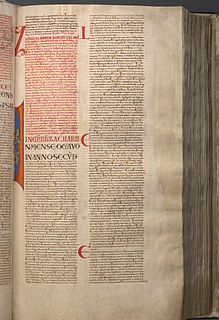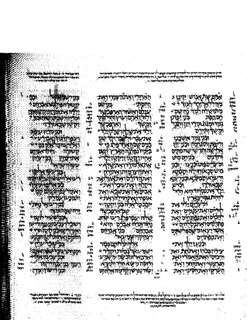Related Research Articles

The Book of Kings is a book in the Hebrew Bible and two books in the Christian Old Testament. It concludes the Deuteronomistic history, a history of Israel also including the books of Joshua and Judges and the Books of Samuel.

Jeroboam I was the first king of the northern Kingdom of Israel. The Hebrew Bible describes the reign of Jeroboam to have commenced following a revolt of the ten northern Israelite tribes against Rehoboam that put an end to the United Monarchy.
Ahijah is a name of several biblical individuals:
- Ahijah the Shilonite, the Biblical prophet who divided the Kingdoms of Israel and Judah.
- One of the sons of Bela. In AV (KJV) called "Ahiah."
- One of the five sons of Jerahmeel, who was great-grandson of Judah.
- A Pelonite, one of David's heroes ; called also Eliam.
- A Levite having charge of the sacred treasury in the temple.
- One of Solomon's secretaries.
- Son of Ahitub, Ichabod's brother; the same probably as Ahimelech, who was High Priest at Nob in the reign of Saul and at Shiloh, where the Tabernacle was set up. Some, however, suppose that Ahimelech was the brother of Ahijah, and that they both officiated as high priests, Ahijah at Gibeah or Kirjath-jearim, and Ahimelech at Nob.
- Father of King Baasha of Israel
The non-canonical books referenced in the Bible includes non-Biblical cultures, and lost works of known or unknown status. By the "Bible" is meant those books recognised by most Christians and Jews as being part of Old Testament as well as those recognised by Christians alone as being part of the Biblical apocrypha or of the Deuterocanon.
Iddo was an important biblical prophet. According to the Books of Chronicles, he lived during the reigns of King Solomon and his heirs, Rehoboam and Abijah, in the Kingdom of Judah.
The Book of Nathan the Prophet and the History of Nathan the Prophet are among the lost books of the Tanakh, attributed to the Biblical prophet Nathan. They may be the same text, but they are sometimes distinguished from one another. No such text is found anywhere in the Tanakh, so it is presumed to have been lost or removed from earlier texts.
The Book of Shemaiah the Prophet is one of the lost books of the Old Testament. It was probably written by the Biblical Prophet Shemaiah, who lived at the time of Rehoboam. The book is described at 2 Chronicles 12:15. The passage reads: "Now the acts of Rehoboam, first and last, are they not written in the book of Shemaiah the prophet, and of Iddo the seer concerning genealogies? And there were wars between Rehoboam and Jeroboam continually."
The Visions of Iddo the Seer is a lost text that was probably written by the biblical prophet Iddo, who lived at the time of Rehoboam. The book is described at 2 Chronicles 9:29:
Now the rest of the acts of Solomon, first and last, are they not written in the book of Nathan the prophet, and in the prophecy of Ahijah the Shilonite, and in the visions of Iddo the seer against Jeroboam the son of Nebat?
The Story of the Prophet Iddo is a lost text that was probably written by the biblical prophet Iddo, who lived at the time of Rehoboam. The book is described at 2 Chronicles 13:22. The passage reads: "And the rest of the acts of Abijah, and his ways, and his sayings, are written in the story of the prophet Iddo."

Ahijah the Shilonite was a Levite prophet of Shiloh in the days of Solomon, as mentioned in the Hebrew Bible's First Books of Kings. Ahijah foretold to Jeroboam that he would become king.
The Prophecy of Ahijah is a lost text which may have been written by the biblical prophet Ahijah the Shilonite. The book is referred to in 2 Chronicles 9:29. The passage reads

In Christianity the figures widely recognised as prophets are those mentioned as such in the Old Testament and the New Testament. It is believed that prophets are chosen and called by God.

Source criticism, in biblical criticism, refers to the attempt to establish the sources used by the authors and redactors of a biblical text. It originated in the 18th century with the work of Jean Astruc, who adapted the methods already developed for investigating the texts of classical antiquity to his own investigation into the sources of the Book of Genesis. It was subsequently considerably developed by German scholars in what was known as "the higher criticism", a term no longer in widespread use. The ultimate aim of these scholars was to reconstruct the history of the biblical text and also the religious history of ancient Israel.

Zechariah 1 is the first chapter of the Book of Zechariah in the Hebrew Bible or the Old Testament of the Christian Bible. This book contains the prophecies attributed to the prophet Zechariah, and is a part of the Book of the Twelve Minor Prophets. As the first of the total 14 chapters in the book, this chapter is a part of a section consisting of Zechariah 1-8. It records an introduction and the first two of eight visions received by the prophet.

Jeroboam's Revolt was an armed insurrection against Rehoboam, king of the United Monarchy of Israel, and subsequently the Kingdom of Judah, led by Jeroboam in the late 10th century BCE, according to the First Book of Kings and the Second Book of Chronicles of the Hebrew Bible. The conflict, referring to the independence of the Kingdom of Samaria and the subsequent civil war during Jeroboam's rule, began shortly after the death of Solomon and lasted until the Battle of Mount Zemaraim. The conflict began due to discontent under the rule of Solomon's successor, his son Rehoboam, and was waged with the goal of breaking away from the United Monarchy of Israel. Though this goal was achieved very early on in the conflict, the war continued throughout the duration of Rehoboam's reign and well into the reign of his son, Abijam, who defeated the armies of Jeroboam but failed to reunite the kingdoms.

2 Kings 1 is the first chapter of the second part of the Books of Kings in the Hebrew Bible or the Second Book of Kings in the Old Testament of the Christian Bible. The book is a compilation of various annals recording the acts of the kings of Israel and Judah by a Deuteronomic compiler in the seventh century BCE, with a supplement added in the sixth century BCE. This chapter focuses on the Israel king Ahaziah, the son of Ahab, and the acts of Elijah the prophet who rebuked the king and prophesied the king's death.

2 Chronicles 9 is the ninth chapter of the Second Book of Chronicles the Old Testament in the Christian Bible or of the second part of the Books of Chronicles in the Hebrew Bible. The book is compiled from older sources by an unknown person or group, designated by modern scholars as "the Chronicler", and had the final shape established in late fifth or fourth century BCE. This chapter belongs to the section focusing on the kingship of Solomon. The focus of this chapter is Solomon's fame and wealth with the visit of the queen of Sheba and the list of his treasures, ending with the report of his death and the history books containing his activities.

1 Kings 11 is the eleventh chapter of the Books of Kings in the Hebrew Bible or the First Book of Kings in the Old Testament of the Christian Bible. The book is a compilation of various annals recording the acts of the kings of Israel and Judah by a Deuteronomic compiler in the seventh century BCE, with a supplement added in the sixth century BCE. This chapter belongs to the section focusing on the reign of Solomon over the unified kingdom of Judah and Israel. The focus of this chapter is Solomon's decline and death.

1 Kings 12 is the twelfth chapter of the Books of Kings in the Hebrew Bible or the First Book of Kings in the Old Testament of the Christian Bible. The book is a compilation of various annals recording the acts of the kings of Israel and Judah by a Deuteronomic compiler in the seventh century BCE, with a supplement added in the sixth century BCE. This chapter belongs to the section comprising 1 Kings 12:1 to 16:14 which documents the consolidation of the kingdoms of northern Israel and Judah. The focus of this chapter is the reigns of Rehoboam and Jeroboam.

1 Kings 14 is the fourteenth chapter of the Books of Kings in the Hebrew Bible or the First Book of Kings in the Old Testament of the Christian Bible. The book is a compilation of various annals recording the acts of the kings of Israel and Judah by a Deuteronomic compiler in the seventh century BCE, with a supplement added in the sixth century BCE. This chapter belongs to the section comprising 1 Kings 12:1 to 16:14 which documents the consolidation of the kingdoms of northern Israel and Judah. The focus of this chapter is the reigns Jeroboam and Nadab in the northern kingdom and Rehoboam in the southern kingdom.
References
- ↑ 2 Chronicles 9:29
- ↑ 1 Kings 11 Commentary, accessed 14 October 2017
- ↑ 1 Kings 11:41 - New International Version